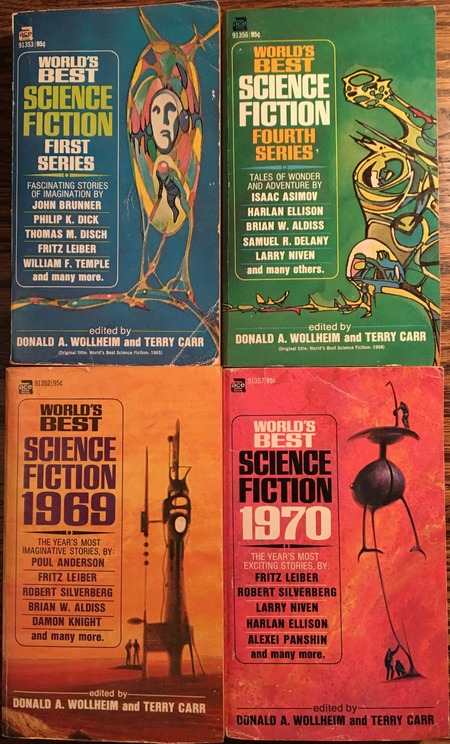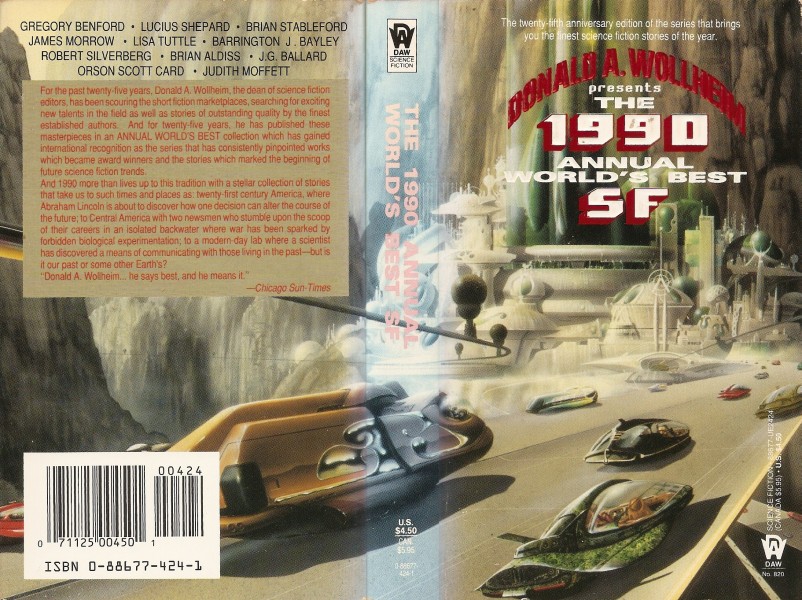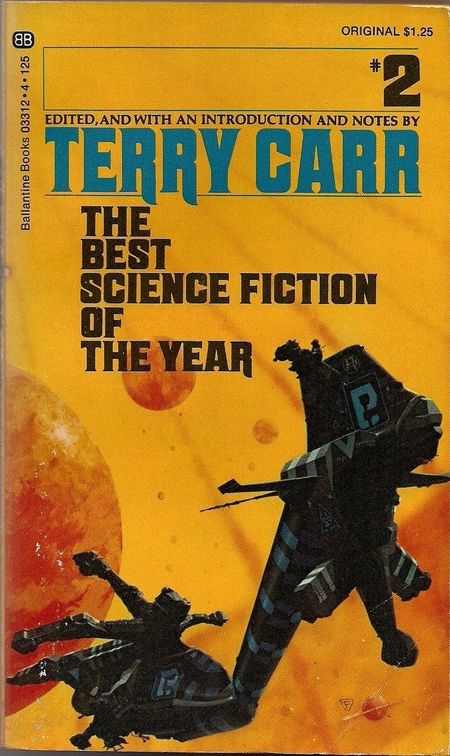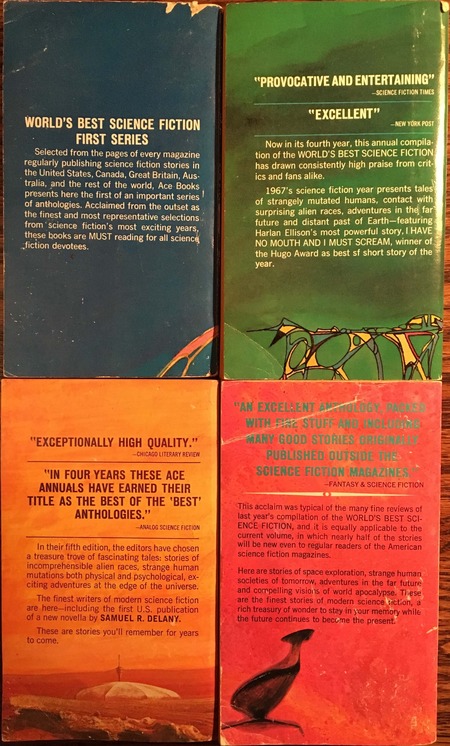Vintage Treasures: World’s Best Science Fiction 1965 – 1970, edited by Donald A. Wollheim and Terry Carr
If you’ve been paying attention over the past two months, you’re probably aware that we’re deep into the Year’s Best Science Fiction season. So far this year Solaris, Night Shade, and Prime Books have all released Best of the Year anthologies (edited by Jonathan Strahan, Neil Clarke and Rich Horton, respectively), and in the next few months we can expect additional volumes by Gardner Dozois, John Joseph Adams, Ellen Datlow, Paula Guran, Stephan Jones, and others.
Now I know what you’re thinking. What the heck, world? My favorite fantasy series gets canceled after three volumes, but eight publishers happily produce Best of the Year anthologies every single year? How is that even possible? And you know, that’s not a bad question. How did we get to the point where the market is willing to bear so many books that all claim to contain the best science fiction of the year?
Everett F. Bleiler and T.E. Dikty are widely credited with creating the first such anthology, The Best Science Fiction Stories: 1949. But our current appetite for Best of the Year volumes can be traced back to Donald A. Wollheim and Terry Carr, two of the most important editors our field has ever seen. Starting in 1965 and running until Wollheim’s death in 1990, together and separately Wollheim and Carr produced over 50 Best of the Year volumes, and in the process they shaped the direction of short fiction in the genre for generations to come. Their books were of such high quality that they were must-reads for all serious fans of science fiction and fantasy. Year after year the Carr and Wollheim anthologies were absolutely indispensable, and if you enjoy the rich assortment of modern Best of the Year editions, you can trace our modern enthusiasm for the format directly back to these two men.
Today we’re going to talk about the World’s Best Science Fiction, the series they edited together, and specifically the four volumes pictured above. The editors resurrected the idea of an annual SF reprint anthology (following in the footsteps of Bleiler and Dikty, as well as Judith Merrill) in 1965, and edited seven volumes together. They took the title seriously, and looked far and wide to fill their pages. Although practically that chiefly meant the US and the UK, it wasn’t unusual to find stories in translation among their selections, and their first volume included stories translated from Czech and Dutch.
The two men eventually split. Carr left Ace in 1972, and Wollheim continued the World’s Best Science Fiction series without him, eventually producing an impressive 26 volumes (the last ten co-edited with Arthur W. Saha). Carr founded a competing series at Ballantine Books, The Best Science Fiction of the Year, which ran for 16 volumes until his untimely death in 1987.
I’m not going to attempt a survey of these books here. Instead I’m going to do something much more exciting: talk about a recent book score. I won all four volumes of Worlds Best Science Fiction in the photo above in an online auction for $2.59, less than 70 cents/book. Is that awesome or what?
Treating these four as a random sample of the entire series (because, hey, what’s more random than winning an eBay auction you bid $2.75 on?) is pretty educational. How awesome was this series? These four volumes contain some of the most celebrated SF of the 60s and 70s, including:
“I Have No Mouth, and I Must Scream” by Harlan Ellison
“Your Haploid Heart” by James Tiptree, Jr.
“Oh, to Be a Blobel!” by Philip K. Dick
“Driftglass” by Samuel R. Delany
“The Man Who Never Was” by R. A. Lafferty
“Hawksbill Station” by Robert Silverberg
“Thus We Frustrate Charlemagne” by R. A. Lafferty
“Time Considered as a Helix of Semi-Precious Stones” by Samuel R. Delany
“Welcome to the Monkey House” by Kurt Vonnegut, Jr.
“A Boy and His Dog” by Harlan Ellison
“Ship of Shadows” by Fritz Leiber
and a whole lot more.
Looking to try some quality science fiction at a great price? Bargains like this are snapped up on eBay and Amazon every day. Pick up a few of these classic Year’s Best anthologies online or at a used book store, and see what you’re missing. It won’t cost you much (less than a buck a book, if you shop around), and chances are it will introduce you to some great new authors.
Here’s the complete Table of Contents for these four volumes.
World’s Best Science Fiction First Series (288 pages, 95 cents, 1970 reprint edition, previous title: World’s Best Science Fiction 1965. Cover by Jack Gaughan.)
This is a 1970 reprint edition of the very first volume in the series, World’s Best Science Fiction 1965. Once the series had proved its viability Ace reprinted the early editions, removing the years in the title and renaming them First Series, Second Series, etc, presumably in the belief that readers would find that more palatable than “a bunch of stories from five years ago.” This inaugural volume contained a story in Christopher Anvil’s Federation of Humanity series, plus fiction translated from Czech and Dutch.
Introduction by Donald A. Wollheim and Terry Carr
“Greenplace” by Tom Purdom
“Men of Good Will” by Ben Bova and Myron R. Lewis
“Bill for Delivery” by Christopher Anvil
“Four Brands of Impossible” by Norman Kagan
“A Niche in Time ” by William F. Temple
“Sea Wrack” by Edward Jesby
“For Every Action” by C. C. MacApp
“Vampires Ltd” by Josef Nesvadba
“The Last Lonely Man” by John Brunner
“The Star Party” by Robert Lory
“The Weather in the Underworld” by Colin Free
“Oh, to Be a Blobel!” by Philip K. Dick
“The Unremembered” by Edward Mackin
“What Happened to Sergeant Masuro?” by Harry Mulisch
“Now Is Forever” by Thomas M. Disch
“The Competitors” by Jack B. Lawson
“When the Change-Winds Blow” by Fritz Leiber
World’s Best Science Fiction: Fourth Series (319 pages, 95 cents, 1970 reprint edition, previous title: World’s Best Science Fiction: 1968. Cover by Jack Gaughan.)
This one has a Known Space novelette by Larry Niven, and “Hawksbill Station,” the Hugo and Nebula nominee for Best Novella by Robert Silverberg — as well as Ellison’s classic “I Have No Mouth, and I Must Scream.”
Introduction by Donald A. Wollheim and Terry Carr
“See Me Not” by Richard Wilson
“Driftglass” by Samuel R. Delany
“Ambassador to Verdammt” by Colin Kapp
“The Man Who Never Was” by R. A. Lafferty
“The Billiard Ball” by Isaac Asimov
“Hawksbill Station” by Robert Silverberg
“The Number You Have Reached” by Thomas M. Disch
“The Man Who Loved the Faioli” by Roger Zelazny
“Population Implosion” by Andrew J. Offutt
“I Have No Mouth, and I Must Scream” by Harlan Ellison
“The Sword Swallower” by Ron Goulart
“Coranda” by Keith Roberts
“Thus We Frustrate Charlemagne” by R. A. Lafferty
“Handicap” by Larry Niven
“Full Sun” by Brian W. Aldiss
“It’s Smart to Have an English Address” by D. G. Compton
World’s Best Science Fiction 1969 (380 pages, 95 cents. Cover by John Schoenherr.)
Lots of good stuff here, including a Berserker tale by Fred Saberhagen, a Rescue Squad novelette by Katherine MacLean, and the Hugo and Nebula Award-winner “Time Considered as a Helix of Semi-Precious Stones” by Samuel R. Delany.
Introduction by Donald A. Wollheim and Terry Carr
“Street of Dreams, Feet of Clay” by Robert Sheckley
“Backtracked” by Burt K. Filer
“Kyrie” by Poul Anderson
“Going Down Smooth” by Robert Silverberg
“The Worm That Flies” by Brian W. Aldiss
“Masks” by Damon Knight
“Time Considered as a Helix of Semi-Precious Stones” by Samuel R. Delany
“HEMEAC” by E. G. Von Wald
“The Cloudbuilders” by Colin Kapp
“This Grand Carcass” by R. A. Lafferty
“A Visit to Cleveland General” by Sydney J. Van Scyoc
“The Selchey Kids” by Laurence Yep
“Welcome to the Monkey House” by Kurt Vonnegut, Jr.
“The Dance of the Changer and the Three” by Terry Carr
“Sword Game” by H. H. Hollis
“Total Environment” by Brian W. Aldiss
“The Square Root of Brain” by Fritz Leiber
“Starsong” by Fred Saberhagen
“Fear Hound” by Katherine MacLean
World’s Best Science Fiction: 1970 (349 pages, 95 cents. Cover by John Schoenherr.)
Three stellar novellas here, including a Gil Hamilton tale by Larry Niven, Fritz Leiber’s Hugo Award-winner “Ship of Shadows,” and Ellison’s Nebula Award-winner “A Boy and His Dog.”
Introduction by Donald A. Wollheim and Terry Carr
“A Man Spekith” by Richard Wilson
“After the Myths Went Home” by Robert Silverberg
“Death by Ecstasy” by Larry Niven
“One Sunday in Neptune” by Alexei Panshin
“For the Sake of Grace” by Suzette Haden Elgin
“Your Haploid Heart” by James Tiptree, Jr.
“Therapy 2000” by Keith Roberts
“Sixth Sense” by Michael G. Coney
“A Boy and His Dog” by Harlan Ellison
“And So Say All of Us” by Bruce McAllister
“Ship of Shadows” by Fritz Leiber
“Nine Lives” by Ursula K. Le Guin
“The Big Flash” by Norman Spinrad
Our previous coverage of Donald Wollheim includes:
The Editor As Author: Donald A. Wollheim’s The Secret of the Ninth Planet by Violette Malan
The Ultimate Invader edited by Donald Wollheim
Tales of Outer Space, edited by Donald A. Wollheim
Kirkus Looks at Donald A. Wollheim and the Ace Double
Our recent coverage of Terry Carr includes:
Decadent Alien Races and Electricity Creatures: Rich Horton on Warlord of Kor/The Star Wasps (1963)
World’s Best Science Fiction 1965 – 1970, edited by Donald A. Wollheim and Terry Carr (1965-1970)
The Best Science Fiction of the Year #3, edited by Terry Carr (1974)
The Best Science Fiction of the Year #4, edited by Terry Carr (1975)
The Best Science Fiction 1974, edited by Lester del Rey, Terry Carr, and Donald Wollheim
A Return to Terry Carr’s Best Science Fiction of the Year
Creatures From Beyond, edited by Terry Carr (1975)
Classic Science Fiction: The First Golden Age, edited by Terry Carr (1978)
The Best Science Fiction Novellas of the Year 1, edited by Terry Carr (1979)
Thomas M. Disch on the Best Science Fiction of 1979
Universe 13 edited by Terry Carr (1983)
See all of our recent Vintage Treasures here.




Does anyone know exactly what happened between Wollheim and Carr? I read somewhere that Terry Carr was actually sacked by Wollheim … in which case it must have been galling for DAW that Terry’s series was so successful—even more popular than the DAW one, in fact.
I have all of these, and just seeing the tables of contents makes me want to get them out and read all those great stories again.
These were terrific anthologies, but I never seemed to pick them up because I was so focused on novels, I guess. Or perhaps, since I was reading ANALOG, GALAXY and F&SF and so had read a lot of the stories. Interesting the amount of Leiber included.
> Does anyone know exactly what happened between Wollheim and Carr?
> I read somewhere that Terry Carr was actually sacked by Wollheim
Dolphin,
Considering that Wollheim and Carr were both very actively involved in fandom at the time, I’m sure there are folks out there who know the story… but I don’t. Carr’s Wikipedia entry says only:
“After conflicts with Ace head Donald A. Wollheim, he worked as a freelancer. ”
So my guess is that you’re right he was fired.
> just seeing the tables of contents makes me want to get them out and read all those great stories again.
Bill,
You and me both! I have a lot of books on my TBR pile ahead of these, but the moment they arrived I very nearly chucked the whole stack and settled in with that first volume….
> These were terrific anthologies, but I never seemed to pick them up because I was so focused on novels, I guess.
RK,
I suppose the opposite was true of me. I never read all the novels people were suggesting to me because I was so focused on all these great anthologies. With the exception of Simak, Herbert, and Piers Anthony, I think I discovered most SF writers in short stories first.
I found the story that I remember reading.
It’s from a 1975 interview of Don Wollheim by Dave Truesdale.
According to Wollheim:
“Well, in the first place let’s understand that I was vice-president of ACE books, editor-in-chief, and had been since the beginning. Terry Carr was hired by me as my assistant editor. And in the course of his work he launched the idea of the ACE Science Fiction Specials, which he did with my permission and A. A. Wyn’s permission. And, of course, Carr went on and it became kind of a difficult scene because Carr was running on his own and was ignoring other people’s advice around the place and the books were not paying off. Mostly because, I think, not because they weren’t good, but mostly because of his insistence on the use of a very standardized cover that turned out to be an economic disaster. News dealers couldn’t tell one from the other, readers couldn’t tell whether they’d read the book or not, and this made for enormous returns of the books themselves, and the books were terrifically unprofitable. It was a very dangerous thing to do, having those covers that way.
Carr himself also changed, becoming rather indifferent to the company. He’d come in late about 10:30 in the morning, and he built up a huge backlog of indifference. Finally it reached the point where, quite frankly, I fired him. Everyone breathed a sigh of relief because it had gotten to be a very unpleasant situation.”
It’s hard to believe that Terry Carr would’ve had such an attitude to his work, given his success almost immediately after this episode. Perhaps there’s another side to the story … but not one I am likely to find out.
Sorry, I forgot to post the link:
http://www.tangentonline.com/interviews-columnsmenu-166/1221-classic-donald-a-wollheim-interview
These are awesome! They did take second place for me, however, to the yearly Ace paperbacks of The Best From Fantasy and Science Fiction. There was just something about those books that I found (find!) irresistible.
OFF Topic, here, mostly, but the 7th collection of Poul Anderson short works from NESFA is available. I’d missed it’s publication, and so just got it.
> Interesting the amount of Leiber included.
– R.K. Robinson
It is easy for us to overlook (or to forget) just how significant Fritz Leiber was in sf/f during the ’60s and ’70s.
Researching for my reading group’s current selection (Swords and Deviltry, the first of his Fafhrd and Gray Mouser collections), I found that “Ill Met in Lankhmar” (1970) was the first novella to win both Hugo and Nebula. So, I also checked on novelettes, and the first dual winner was his “Gonna Roll the Bones” (1967). For short stories, the first was “Repent, Harlequin”, by Harlan Ellison. The *second* was “Catch That Zeppelin” (1975), by Mr. Leiber.
Ahem … Eugene, “The Last Castle”, by Jack Vance, was in fact the first novella to win both the Hugo and the Nebula. It was designated a novelette for the Hugos; nevertheless, it was a novella in terms of the categories that are now standard for both awards.
It was only from 1973 onward that the Hugos fell into step with the Nebulas, and the short fiction categories have been identical for both awards since that year.
> “The Last Castle” by Jack Vance was, in fact, the first novella …
– dolphintornsea
Very true! I was simplifying for my reading group so as not to get into the sticky issue of Hugo/Nebula novella vs. novelette, never mind the year issue (Nebula being year of publication, Hugo being year of award).
And no disrespect toward Mr. Vance, either. I simply wanted to indicate how respected was Mr. Leiber at the time, even as he is less recognizable these days.
I have a nice list of all the dual Hugo/Nebula winners, if you’re interested 🙂
dolphintornsea,
Thank you, that would be a good list to have.
– Eugene R.
Email me at pfnel64@gmail.com; I’ll send you the Excel.
They did a 1971 volume together, too…the SF Book Club editions of the 1970 and 71 volumes were the first BOTY volumes in SF that I had access to…and a bit odd SFBC didn’t get around to doing their own editions of the WORLD’S BEST till ’70, IIRC…if earlier, not much earlier.
It’s not as if they didn’t do the Bleiler/Ditky/Kemp annuals, and the Merril, beforehand.
> I found the story that I remember reading.
> It’s from a 1975 interview of Don Wollheim by Dave Truesdale.
Dolphin,
Thanks for sharing that! Figures it would be Dave who scored the scoop. He’s been responsible for an enormous amount of scholarship in genre short fiction that gets overlooked.
> These are awesome! They did take second place for me, however, to
> the yearly Ace paperbacks of The Best From Fantasy and Science Fiction.
Thomas,
You know, I never gave that series the attention it probably deserved. Maybe I just didn’t like how inconsistent the covers where? I dunno. But you’re right — the magazine was excellent, I should have paid more attention to the annual anthologies.
> OFF Topic, here, mostly, but the 7th collection of Poul Anderson short works from
> NESFA is available. I’d missed it’s publication, and so just got it.
RK,
Off-topic maybe, but definitely not unwelcome info. I’ve been snapping these up as they became available, and somehow the 7th volume totally flew under my radar. Thanks for the tip!
> They did a 1971 volume together, too…
Todd,
Right you are. And it was a fine volume to go out on, with “Slow Sculpture” by Theodore Sturgeon, “Continued on Next Rock” by R. A. Lafferty, and stories by Larry Niven, Robert Silverberg,y Bob Shaw, Isaac Asimov, Clifford D. Simak, Gregory Benford, Michael G. Coney, Neal Barrett, Jr., Gordon Eklund, and others.
> the SF Book Club editions of the 1970 and 71 volumes were the first BOTY volumes in SF that I had access to…
I was introduced to the series by the SF Book Club too! Although I didn’t join until 1976, so I must have bought the SFBC editions in a used book store.
I like Robert Lory. I think he is a hidden treasure out there.